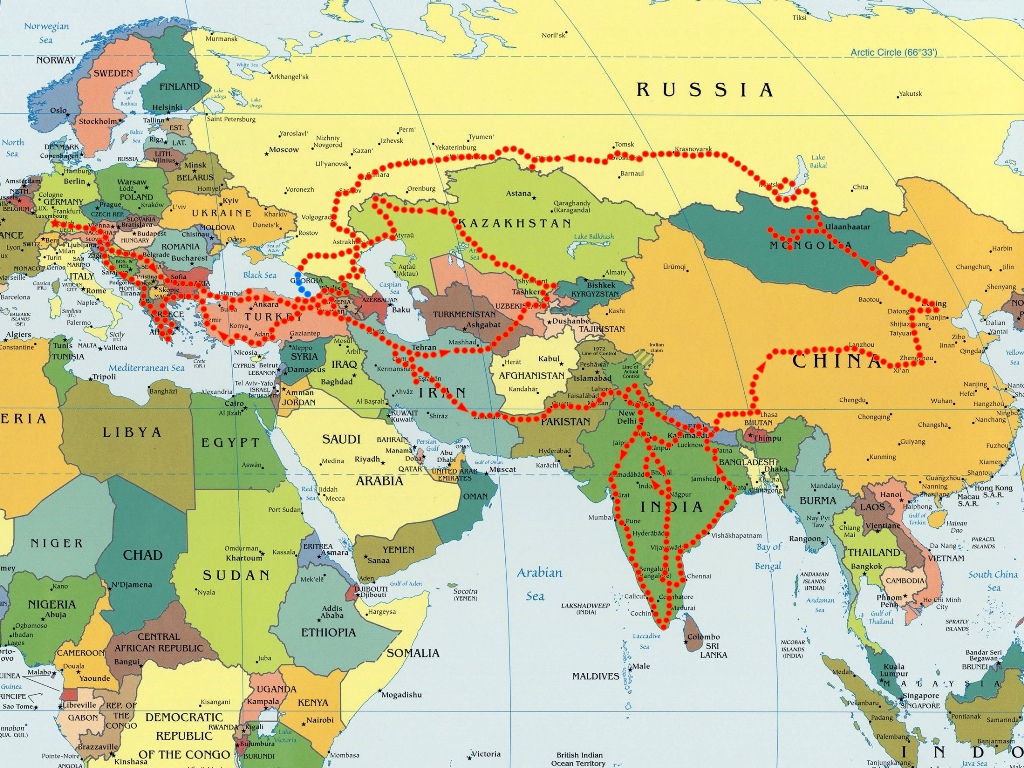

Texte Nepal 1 | Kathmandu, August 2011
We met Gaurav Monga in august 2011 in the Jhamsikhel quarter of Kathmandu.
Gaurav:
So, I was born in Delhi and till sixth class I have been in Delhi. And then I have been in Southindia at a school there, and I have been there till tenth class. And then my familiy moved to USA.
So I lived for a short period in Delhi and then in Southindia, in a small village on a hill and then we moved.
And I lived at two places there in America. I spent nearly five years there. And then I came back to India and I lived in different cities here.
In the meantime I studied in Delhi and learned German in Poona and worked here and there, for example in Hyderabad, Bangalore, Achmedabad.
The last station was Delhi and now we are in Nepal in Kathmandu, my girlfriend an me.
Roland:
You are Indian, are you Hindu therefore?
Gaurav:
Yes.
Roland:
Is that important for you?
Gaurav:
The religion?
It is like this, Hinduism really is a little strange for me. I come from a Hindu-family, but my grandparents and my parents did not bring me up religious.
Yes, of course I know that there are such gods and for example there are feasts and so on. But Hinduism really means not too much for me. My name is hinduistic but I am really not a Hindu.
Nicole:
How would you name yourself?
Without denomination? Atheistic?
Gaurav:
Not atheistic, I believe on god, but he shall not belong to a religion. God can exist without religion. I believe and I believe in god. I believe in the importance of the belief in god.
Is that understandable?
Roland:
Yes. It is a very philosophical view.
Gaurav:
(laughs) Yes maybe … maybe yes. It is possible … philosophical view.
But yes … yes, the rituals for example, which belong to my religion, in these I never took part. And therefore – if somebody says to me ‘You should do it’, because I am Hindu – as I am not grown up with these rituals they are unfamiliar to me, they are not for me.
Roland:
Is this typical for the new generation in India?
Gaurav:
I suppose, it refers to the social class. I come out of a rich family.
And I suppose, the rich families gave up the religion somehow.
But I suppose, that rituals still remain for the middle classes. Although India is modernised. Perhaps it flagged, the attention to the rituals and belief. But most of my friends for example come out of the middle class. And what I observed is, that they believe in god. It is not only a question of belief, but they take part in these rituals. For them it is more important.
And I suppose, that applies not only to Hindus, that applies to Moslems too, as I have seen.
The people who belong to the middle class obey the rituals more, for example they fast.
How I observed, the upper class somehow, some time … yes … gave up religion.
Roland:
You talk about classes and that is not cast?
Gaurav:
No, not cast.
Roland:
Casts don’t play a big role anymore?
Gaurav:
No, no, they play a role. But the brahmin _ for example believes in god. The shudra _(workman, day labourer) believes in god too. They are only classes of society. They are only classes of society and what they are doing, can be different. But they both believe in god within their own class. But if I speak about economical classes … that are for example the most, which are rich, even perhaps they don’t belong to a higher caste, some time gave up the believe in god. But that is in a sense a generalisation. There are of course rich people, which follow all the things.
But what I noticed, the rich people, which belong to this modern society, want to leave the rituals, they want the new life.
For different reasons, there is much – American for example – much western thinking, that comes in on many channels. For example that has also to do with clothes and with personal independence. Many people think, OK, I have not to marry and such things.
As I see this still remains in the middle class.
One has to get married, one has to follow the parents.
Roland:
What does that mean for you?
Gaurav:
Yes, it’s very interesting for me too. I am a little ‘anglised’ … yes. In the schools for example, which I attended, all the main subjects have been teached in English. And somehow the culture was more English or American. The first school was named ‘British School’ And the people have been international. The school still exists. Later I teached at this school as a teacher too. And there are diplomats, which live in this area. There are people from nearly all countries, from Europe, from Asia, from Africa.
And when I moved to America, it was not so strange. OK, I got an idea of this culture already in my home country, yes … I had already an idea.
But I was also in the south of America. For America that is a ‚lower’ culture too, somehow a subculture exists too. The south is different to the north of America too. They speak different, they have their own classes.
When I came back, it was the first time, that I saw the genuine India.
Because I suddenly was in Poona and the people, which whom I lived together, mainly came out of villages and didn’t speak any English word. And never in my Indian time I had an Indian, who was my friend … it is really a little funny … OK, Hindi I speak, because in one sense it is my mother tongue … what really is Punjabi. But we are brought up with speaking English in school.
In English one has to learn and speaks English with the friends and with the parents. And I only spoke Hindi with people, who didn’t speak any word English.
That means for example workers, which didn’t learn English. That means for example my grandmother, she didn’t speak English.
When I came back, I saw that there are people who are totally different.
And somehow that was even in my own country a cultural shock for me.
But it was good and this people were very friendly, more grounded in my opinion. And some of this people are still friends.
But I have been homesick, I wanted to go back to America. Because I thought, that I will study there and then working there perhaps. And then I came back to this people, who did not understand me. OK, of course I spoke Hindi at that time – but not as well. And I was not used, normally to speak Hindi. It is really a little funny, no … or ironical, yes. It should rather be my mother tongue. But little by little I understood.
I can remember one experience very good. I came back in the first week in 2001 … I speak too much, or? (laughs) … and it was really funny. OK, my cousin invited me, there was a birthday party for his friend. I know his friend, his friend was my friend too, OK, acquaintance, a good man. And I went there. And there are such situations, the people for example, they belong to the higher classes of society, they belong to the rich.
And … yes, I was so bored, I nothing had to talk with the people.
They talk about clothes or … yes I don’t know, it was such a very stupid thing for me.
And … what? … what are you talking about?
Yes … I know, a girl showed me her buttocks and asked: ‘Do I look good?’, she did not know me at all. OK, and I asked ‘What? You don’t know me, why do you show me your buttocks?’ (laughs) And it was little funny. And there are people who are working there, as cleaning woman or for example the cook and others. And the whole evening I spent with these people. Not with my so-called friends or acquaintances. Because I was so bored and pretty drunken too. And I simply didn’t want to talk with these people – they talked with me about nothing.
And at this moment I realised, that I could understand the middle class better. They have the same problems. They are more grounded. The rich only speak about discos and drinking and they visit only two countries: America and England. And that is the world for them … yes … it is not a judgement in that sense. But at that time I realised, although I was born and brought up in this class, I no more have relation to this class in India. And because I was in Poona at that time I had to learn Hindi good, because this people did not speak any English word.
But they were friends and I wanted … I could understand – it was not, that I could not understand – but not so good, that I could speak it even. That was interesting.
But also when writing. If you say, OK, I am writer. That was always a problem with language.
I am Indian, I wanted to describe Indian situations in writing. But sometimes it is impossible. Because I am writing in English and this situations in English doesn’t exist at all. That always is an obstacle. It is a challenge. Because I have to find out, how I can write it in another way, how I can work it out.
I don’t like to be superficial, simply looking for correspondence or nearly-correspondence.
But somehow I have to show these situations, which are not … for example in a story, which I wrote, which was published last year.
I show a market, which in my thoughts is in Delhi. But if I say, that it is Delhi, then I have to construct the language or the dialogues in Hindi. But I named it only ‘market’. There is all in my imagination what belongs to this market, but it’s name I never wrote. So it always can be a market in imagination. It has not to be in Delhi, although the original idea, which I had in brain, was Delhi.
So have language and coming back and culture and all also to do with my writing, because there are always problems. Many situations are better expressed in my brain in Hindi, but … however … I am not so good in this language.
